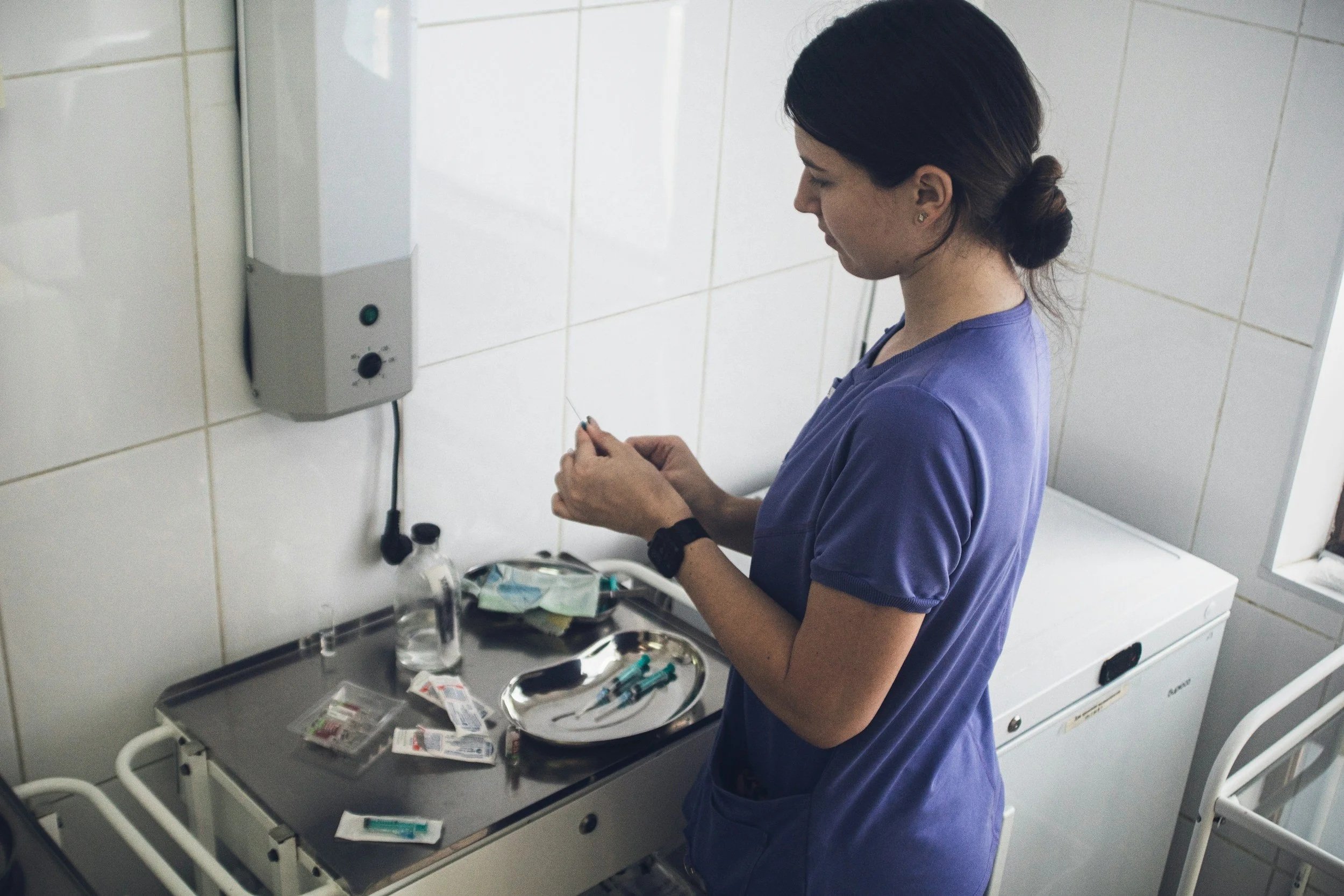Endometriosis can reduce egg freezing success by impacting egg quality and ovarian response, especially when endometriomas (cysts on the ovaries caused by endometriosis) are present. While the egg freeze cycle itself remains largely unchanged compared to cycles in patients without endometriosis, cysts may complicate stimulation and retrieval.
What exactly is endometriosis?
The inner lining of the uterus is called the endometrium, which thickens each month to support a pregnancy. When a pregnancy doesn’t occur, the endometrium sheds to cause a period. In endometriosis, there’s endometrial tissue outside of the uterus, on structures such as the ovaries or the fallopian tubes. This tissue still responds to the hormonal changes that happen with the menstrual cycle, so it thickens and bleeds, but can’t exit the body. This leads to inflammation and scar tissue.
Symptoms vary but are often worse during menstruation. People with endometriosis may have pelvic pain, pain with sex, pain with urinating or bowel movements, as well as heavy or irregular periods. Some women may notice bloating or may have difficulty becoming pregnant.
How does endometriosis affect egg freezing success?
Egg quality may be compromised, particularly when endometriosis affects the ovaries. Studies show women with ovarian endometriosis often have lower antral follicle counts (AFC) and reduced anti-Müllerian hormone (AMH) levels, both indicators of diminished ovarian reserve. Inflammation and oxidative stress caused by endometriotic lesions can impair follicular development and reduce the number of mature eggs retrieved.
Some women experience cramping, bloating, or spotting after egg retrieval, which are all normal post-procedure symptoms. However, these may be more pronounced in patients with extensive disease, larger ovaries, or high egg yield, due to inflammation and pelvic sensitivity.
So what is meant by “egg quality”?
Egg quality refers to the egg’s ability to develop into a healthy pregnancy. Factors that can influence egg quality include having a correct number of chromosomes, maturing properly, and being capable of successful fertilization.
Egg quality can be impacted by inflammation, oxidative stress, or altered ovarian environment (for example, the presence of cysts). As we mentioned, endometriosis will potentially do all of these things, meaning it can lead to a decreased quality or quantity of eggs. However, it’s still very possible to have a successful egg retrieval.
How does endometriosis affect the actual egg freezing procedure?
The procedure itself is generally not altered by endometriosis unless endometriomas are present. Endometriomas can interfere with ovarian stimulation by occupying space and disrupting follicular growth. This may lead to fewer eggs retrieved or dyssynchronous response to medications.
Timing is critical: Starting a cycle when follicles are uniform in size improves outcomes. A cyst present at baseline may skew follicular recruitment.
Surgical removal of endometriomas should be carefully considered. While surgery may improve access and reduce inflammation, it can also damage healthy ovarian tissue and reduce egg reserve and lower egg yield. Egg retrieval requires precision: Providers must avoid puncturing endometriomas during aspiration to prevent infection or rupture.
In summary, endometriosis can make egg freezing more challenging by affecting egg quality, ovarian response, and retrieval conditions, especially if endometriomas are present. However, with an individualized plan and care monitoring, patients with endometriosis can still achieve good outcomes and safely free their eggs.
References:
Save 20% on AMH + Fertility Testing
Save 20% with code “FREEZE” on Women's Fertility AMH Test and Women's Fertility Ovarian Reserve Test.

Dr. Alison Peck is a double board-certified reproductive endocrinologist and infertility specialist practicing in the San Fernando Valley over the last two decades at HRC Fertility in Encino and Westlake Village. She is deeply passionate about egg freezing, stopping the biological clock, and helping couples conceive through IVF, genetic testing, and third-party reproduction. Known for her compassionate care and scientific rigor, Dr. Peck empowers patients to take control of their fertility journey with clarity and confidence. Her clinical expertise and personal dedication make her a trusted leader in reproductive medicine.
Learn more about HRC Fertility’s egg freezing practice on Freeze.
Answered by Dr. Roy Handelsman from HRC Fertility. Understand how ovarian cysts and ovarian surgery may impact the egg freezing process.
Answered by Dr. Rashmi Kudesia from CCRM Fertility Houston. Here’s a checklist for before, during, and after your egg freezing consultation, including 11 questions you should ask the doctor.
Answered by Valerie Shafran, MSN, FNP-C from Extend Fertility. Discover why fertility experts urge women to stop taking GLP-1 agonists before an egg freezing cycle.
Answered by Dr. Nidhee Sachdev from South Coast Fertility Specialists. Explore what AMH tells us about a woman’s ovarian reserve or how many eggs she has left.
Answered by Dr. Hade from Generation Next Fertility. Understand how egg freezing does not cause long-term weight gain yet there is a chance of transient bloating.
Answered by Rijon Charne, JD from Sunray Fertility. Explore what a reproductive estate plan entails and the situations where having one can make a big difference.
Answered by Rijon Charne, JD from Sunray Fertility. Learn more about the importance of clinic disposition forms, including what they do and don’t cover.
Answered by Rijon Charne, JD from Sunray Fertility. Discover the legal nuances that can shape your options when freezing eggs or embryos.
Answered by Dr. Joshua Klein from Extend Fertility. Learn how birth control relates to egg freezing and if you will need to stop your hormonal birth control before starting the procedure.
Answered by Dr. Jesse Hade from Generation Next Fertility. Discover the important factors that affect chances of egg freezing success in your late thirties.
Answered by Sidonia Buchtova, PA-C, C-RHI from Refresh Psychiatry. Understand if you can stay on an SSRI or SNRI when freezing your eggs.
Answered by Sidonia Buchtova, PA-C, C-RHI from Refresh Psychiatry. Discover tips to help support your mental well-being during preparation, throughout the cycle, and after your egg retrieval, especially if you have a history of anxiety.
Answered by Dr. Katharina Spies from Vida Fertility. Learn about who should consider supplements before and during fertility preservation, and how supplements could support your egg freezing cycle.
Answered by Dr. Serin Seckin from Generation Next Fertility. Understand the key differences to help you make an informed decision that aligns with your personal and reproductive goals.
Answered by Dr. Ido Feferkorn from the Reproductive Medicine Group. Learn how Polycystic Ovarian Syndrome (PCOS) may affect the egg freezing process and outcomes of fertility preservation.
Answered by Dr. Meera Shah from Nova IVF. Understand the potential risks of egg freezing to help you evaluate if it is right for you.
Answered by Dr. Hade from Generation Next Fertility. Learn from start to finish the entire process of what happens on the final day of an egg freezing cycle.
Answered by Dr. Sahar M. Stephens from Northern California Fertility Medical Center. Understand the probability of pregnancy based on the number of eggs frozen and the age at which you freeze.
Answered by Dr. Alison Peck from HRC Fertility. Discover which medications are commonly used for ovarian stimulation during an egg freezing cycle.
Answered by Dr. Kathryn Snow from Piedmont Reproductive Endocrinology Group (PREG). Understand the side effects that you may experience when freezing your eggs.
Answered by Lia Schiller, MSN, AGNP-BC from Extend Fertility. Learn why IUDs can stay in place throughout the egg freezing process.
Answered by Dr. Woo from HRC Fertility. Learn how some medications need to be stopped for an egg freezing cycle while some medications can be continued.
Answered by Dr. Dan Nayot from The Fertility Partners. Learn how artificial intelligence is providing women with more information than ever before about their eggs.
Answered by Dr. Joshua Klein from Extend Fertility. Egg freezing doesn’t impact your chance of getting pregnant naturally, because egg freezing makes use of eggs that would otherwise have been lost.
Answered by Dr. Dan Nayot from The Fertility Partners. Understand the distinction between egg quantity and quality, and explore how AI is transforming egg quality analysis.
Answered by Dr. David E. Tourgeman from HRC Fertility. Understand what options exist for what to do with your frozen eggs if you decide not to use them for IVF.
Answered by Dr. Armando Hernandez-Rey from Conceptions Florida. Learn about minimal stimulation egg freezing cycles and how they can decrease the risk of ovarian hyperstimulation syndrome.
Answered by Dr. Ido Feferkorn from the Reproductive Medicine Group. Find out how egg freezing medications work and how protocols can be adjusted if you can’t take estrogen.
Answered by Dr. Ido Feferkorn from Reproductive Medicine Group. Learn how egg freezing fits into the menstrual cycle and how timing can be customized.
Answered by Dr. Elena Santiago from Vida Fertility. Understand the ins and outs of egg freezing in Spain as a non-resident, including timing, costs, and more.
































